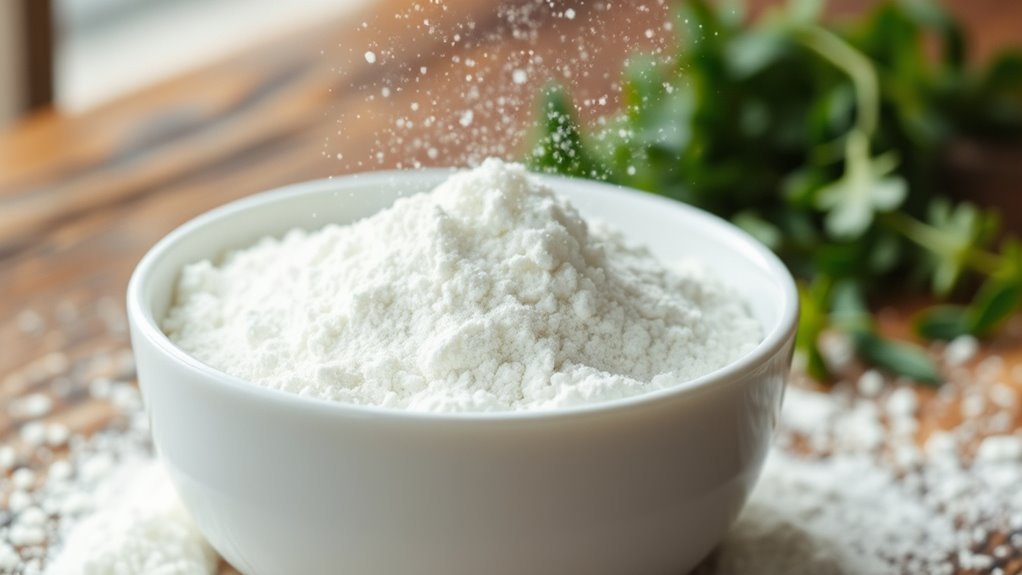Cornstarch isn’t keto-friendly due to its high carbohydrate content. Just one tablespoon has around 7 grams of carbs, which can disrupt ketosis and lead to blood sugar spikes. Most keto dieters aim for 20-50 grams of carbs daily, making cornstarch a poor choice. However, there are lower-carb alternatives like xanthan gum or psyllium husk that can effectively thicken your meals without hindering your diet. There are plenty of options to explore for managing your dietary goals effectively.
Understanding Cornstarch and Its Uses

Cornstarch, a fine white powder derived from the endosperm of corn kernels, plays a versatile role in both cooking and food production. It’s primarily used as a thickening agent in sauces, soups, and gravies, allowing you to achieve that perfect consistency. When heated with liquid, cornstarch gelatinizes, creating a smooth texture that’s essential for many dishes. You might find it in desserts, where it helps stabilize fillings and custards, ensuring they set properly. Additionally, cornstarch can be used in frying to create a crispy coating for meats and vegetables. Its ability to absorb moisture and prevent clumping makes it valuable in various food applications, empowering you to elevate your culinary creations with ease and precision.
Nutritional Profile of Cornstarch

While you might use cornstarch for its culinary benefits, it’s essential to understand its nutritional profile, especially if you’re considering dietary choices like keto. Cornstarch has a caloric content of about 30 calories per tablespoon, primarily derived from carbohydrates. This might not seem significant, but when you’re on a low-carb diet, every calorie counts. Its glycemic index is relatively high, typically around 70, which means it can cause a rapid spike in blood sugar levels. This characteristic can be problematic for those on a keto diet, where stable blood sugar is vital. Understanding these factors can empower you to make informed choices about incorporating cornstarch into your meals, balancing your culinary needs with your dietary goals.
Cornstarch’s Carb Content and Keto Compatibility

When evaluating whether cornstarch fits into a keto diet, it’s essential to take into account its carbohydrate content. Cornstarch is primarily made up of carbohydrates, which can hinder your keto goals. Here are some key points to reflect on:
- Carb Count: One tablespoon of cornstarch contains about 7 grams of carbs, which can quickly add up.
- Keto Limits: Most keto dieters aim for 20-50 grams of carbs daily, making cornstarch a poor choice.
- Thickening Alternatives: Low carb thickening options, like xanthan gum or psyllium husk, can be more suitable.
- Cornstarch Substitutes: Exploring these substitutes can help maintain your keto lifestyle without compromising your dietary needs.
Understanding these factors can guide you in making informed choices.
Keto-Friendly Alternatives to Cornstarch
For those adhering to a keto diet, finding suitable alternatives to cornstarch can greatly enhance meal preparation without sacrificing flavor or texture. You can explore various keto substitutes that serve as effective low carb thickeners. For instance, xanthan gum is a popular choice; it thickens at a small amount and has minimal carbs. Another option is guar gum, which is also low in carbohydrates and works well in sauces and soups. Additionally, coconut flour can be used, although in larger quantities, it may require adjustments to your liquid ratios. Finally, psyllium husk is effective for thickening while adding fiber. Each of these alternatives can help you maintain keto-friendly dishes while achieving the desired consistency in your recipes.
Tips for Incorporating Cornstarch in a Low-Carb Diet
Incorporating cornstarch into a low-carb diet requires a strategic approach, as its carbohydrate content can quickly add up. To enjoy cornstarch while maintaining low-carb principles, consider these tips:
- Use Sparingly: Limit the amount of cornstarch in your recipes to keep carb counts low.
- Experiment with Cornstarch Substitutes: Try alternatives like almond flour or xanthan gum to achieve similar textures without the carbs.
- Balance Your Meals: Pair cornstarch with high-fiber, low-carb ingredients to offset its carb impact.
- Explore Low Carb Recipes: Seek out recipes specifically designed to incorporate small amounts of cornstarch while keeping overall carbs in check.
Frequently Asked Questions about Cornstarch and Keto
1. Is cornstarch keto-friendly?
Cornstarch is not considered keto-friendly due to its high carbohydrate content. A typical serving of cornstarch contains around 30 grams of carbs per ¼ cup, which can easily exceed the daily carb limit for those following a ketogenic diet. Therefore, it’s best to avoid cornstarch on a keto diet.
2. What makes a food keto-friendly?
A food is considered keto-friendly if it is low in carbohydrates and high in healthy fats. Generally, keto diets limit daily carb intake to 20-50 grams, focusing instead on protein and fat sources to promote ketosis, a metabolic state where the body burns fat for fuel instead of carbs.
3. Are there any alternatives to cornstarch for keto diets?
Yes, there are several keto-friendly alternatives to cornstarch. Options include almond flour, coconut flour, and psyllium husk. These alternatives can be used as thickening agents or for baking, providing low-carb options that align with keto dietary restrictions.
4. Can I use cornstarch in small amounts on a keto diet?
While it’s technically possible to use very small amounts of cornstarch without exceeding your carb limit, it’s not advisable. The risk of exceeding your daily carb intake is high, and it’s more beneficial to choose ingredients that are specifically tailored for keto diets to maintain ketosis effectively.
5. How can I thicken sauces or soups without cornstarch on a keto diet?
You can thicken sauces or soups on a keto diet using several methods. Common options include using xanthan gum, which is a low-carb thickener, or reducing the sauce over heat to concentrate its flavor and thickness. Additionally, pureed vegetables like cauliflower can add thickness without significantly increasing carb content.
References
- https://www.healthline.com/nutrition/cornstarch-keto
- https://www.ncbi.nlm.nih.gov/pmc/articles/PMC7078349/
- https://www.medicalnewstoday.com/articles/cornstarch
- https://www.webmd.com/diet/what-is-keto-diet
- https://www.mayoclinic.org/healthy-lifestyle/nutrition-and-healthy-eating/expert-answers/keto-diet/faq-20467294
- https://www.cdc.gov/nutrition/index.html
- https://www.usda.gov/topics/food-and-nutrition


